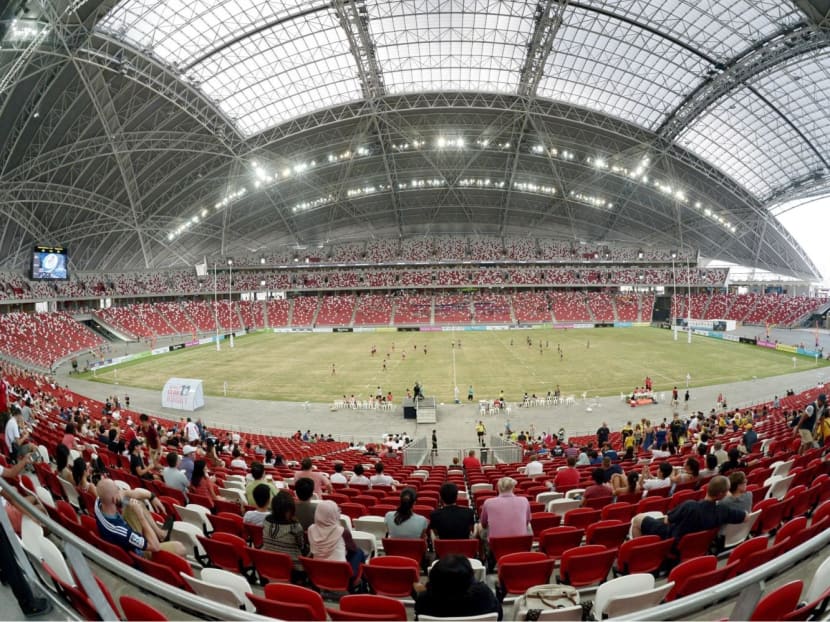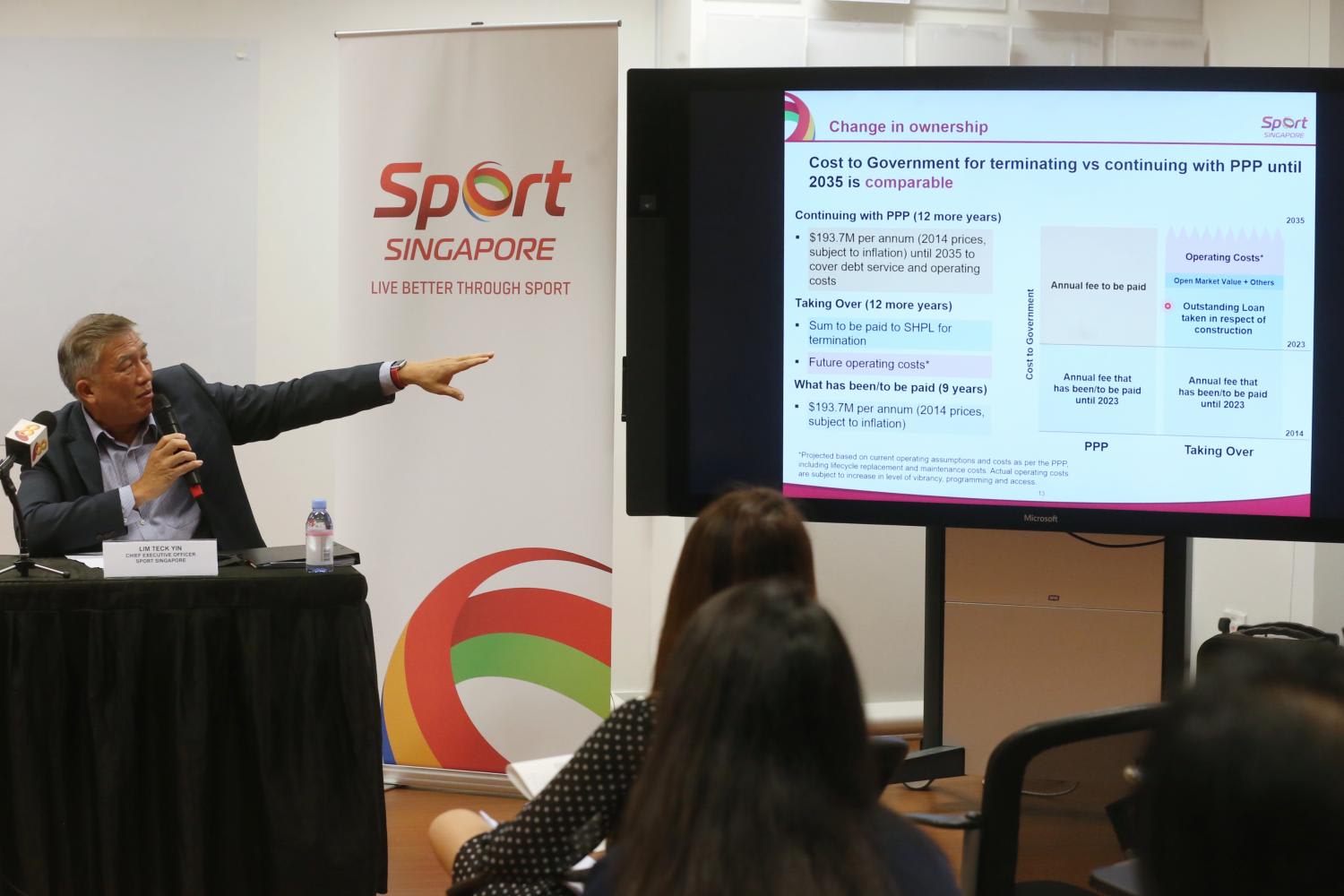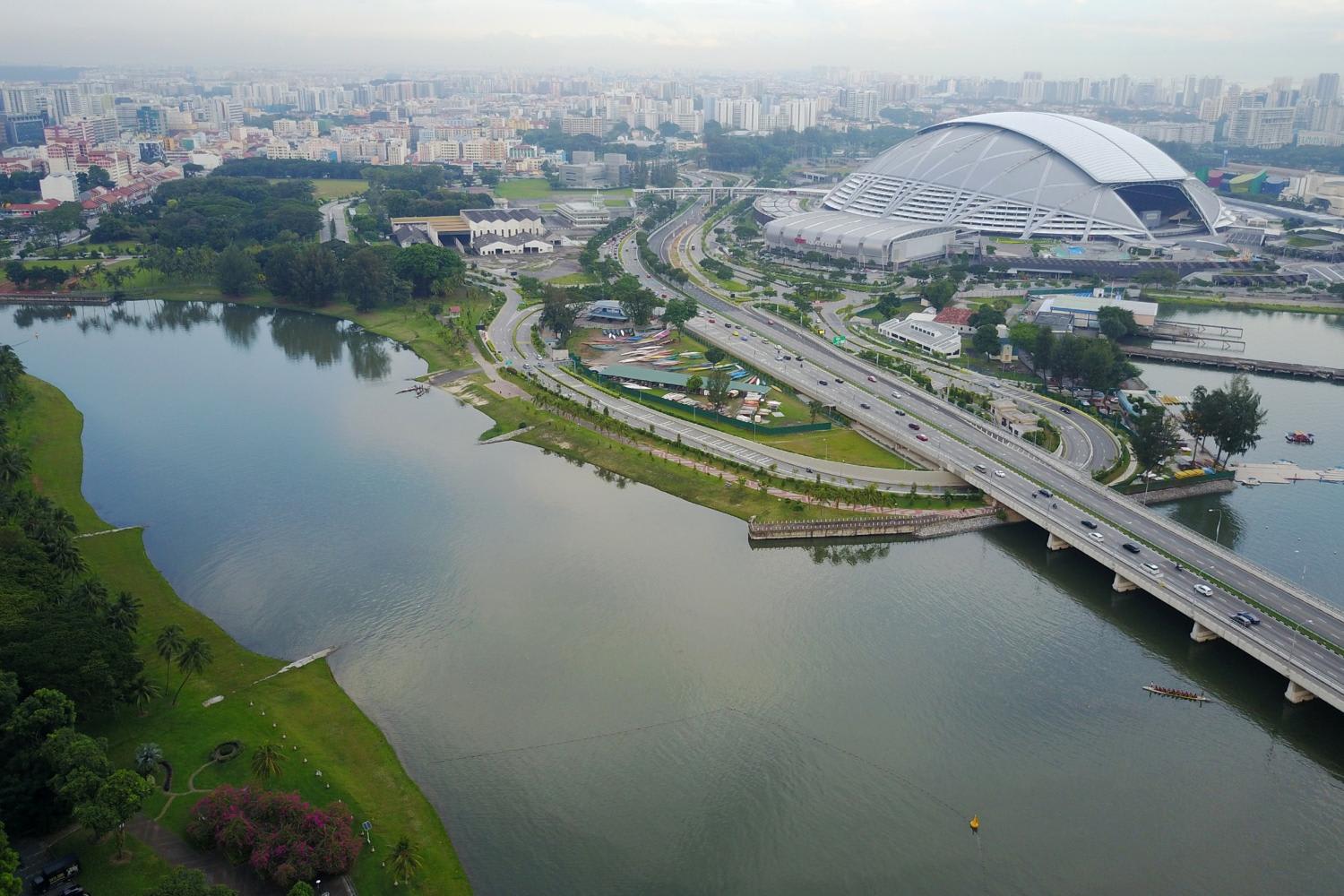Sports Hub takeover: Mismatched goals likely doomed public-private partnership from the start, say former senior execs
SINGAPORE — The different visions and targets held by the public and private parties in managing the Singapore Sports Hub likely doomed the partnership from the start, two of its former senior executives said, including a chief executive.

- SportSG announced that it is breaking ties with a private consortium in managing the Singapore Sports Hub
- Analysts said that a difference in goals between the private and public sectors in running the hub set it up for failure
- There was also not enough interest in sports and easy access to sporting events
- Analysts estimated that future operating costs will be higher without the partnership
- They also questioned how SportSG will differentiate the hub from other community stadiums
SINGAPORE — The different visions and targets held by the public and private parties in managing the Singapore Sports Hub likely doomed the partnership from the start, two former senior executives — including its ex-CEO — told TODAY.
Former Sports Hub chief executive officer Oon Jin Teik said that the tricky part of running the sports and leisure venue seamlessly under the public-private partnership model was trying to balance profit making with providing a public service.
“That means both parties must understand the other party’s objectives well,” he said.
Mr Oon, a former national swimmer, was the third CEO of the Sports Hub after it opened its doors in June 2014.
It was announced on Friday (June 10) that national sports governing body Sport Singapore (SportSG) was taking over to manage and operate the Singapore Sports Hub from Dec 9.
This ends its partnership with private consortium SportsHub Pte Ltd (SHPL) 12 years ahead of time.
Mr Jose Raymond, a former senior director of the Singapore Sports Hub, said that in order for the public-private partnership to work, there has to be an alignment of ideals.
“SHPL was made up of multiple consortium partners, all with their own set of profits and losses to consider," he said.
“In this case, it can be argued from a public policy perspective that the Government views the Singapore Sports Hub as public goods, such that it has to be accessible to as many levels of people in society.”
Professor Lawrence Loh, director at the Centre for Governance and Sustainability at National University of Singapore (NUS) Business School, said so as well that the private sector had differing goals from the Government.
“The profit objective of the private sector is something that does not exist for the public sector.
“So the whole configuration of the partnership will have to reach certain business deliverables to be successful.”
“The problem is not the public-private partnership model in this case, but it is the subject matter of the partnership, which is sports.Professor Lawrence Loh, director at the Centre for Governance and Sustainability at NUS Business School”
Despite the Singapore Sports Hub partnership being cut off early, Prof Loh cautioned against lumping all public-private partnership projects together and added that such a working model is here to stay because it is still useful for other projects.
“The problem is not the public-private partnership model in this case, but it is the subject matter of the partnership, which is sports.
“If you look at other public-private partnership projects like the ITE College West or the SingSpring Desalination Plant, they have clear revenue streams.”
Another professor agreed that this model could work for other projects involving water or electricity companies, for instance.
Professor Sumit Agarwal, a Low Tuck Kwong Professor at the NUS Business School, said: “You may want the delivery of power done by the private sector because it is better at laying them, and the private firms can make some profit in the long run.”
The professor in the departments of economics, finance and real estate at NUS also highlighted that businesses driven by the bottom line could run projects efficiently and at less cost.
Aside from that, public-private partnerships also have other benefits in encouraging advancements, especially when it comes to technology and sustainability.
“We can’t take one partnership that broke up to imply that this is not a workable model in the long run.Professor Sumit Agarwal, a Low Tuck Kwong Professor at the NUS Business School”
Noting that governments can benefit from the private sector’s innovation abilities, Prof Sumit said that public-private partnerships are one way that governments can incentivise private businesses to innovate in areas that may see profits only after a long while, or receive intangible benefits.
These areas would not typically attract investments from the private sector, which is profit-driven. Therefore, government incentives are required.
“We can’t take one partnership that broke up to imply that this is not a workable model in the long run,” Prof Sumit added.
Prof Loh and Prof Sumit said that there is just not enough interest in sports here and the scant access to sporting events are also factors that led to the dismantling of ties between the two sides.
Prof Sumit said that for the Singapore Sports Hub to attract people to its premises, it would need to “make it free or reduce prices” of events.
Mr Kwa Kai Xiang, co-author of a book about public-private partnerships in Singapore, emphasised that for such a partnership to succeed, a mutual understanding of project goals by both the public and private sectors is needed — in terms of the pursuit of value-for-money and good quality public service delivery.
Clear awareness on the part of both the public and private agencies of the expected financial commitment by the private agency towards the proposed project is also important.
Mr Kwa, who is a lecturer in the School of Social Sciences at Nanyang Technological University, added: “This can help both the public and private agencies in question to accurately assess the financial competency or ability of the private agency to commit to the proposed project.”
NATIONALISATION COSTLIER THAN THE PARTNERSHIP
The exact cost that SportSG incurred for the takeover was not publicised.
SportSG explained that it was taking charge fully so that it could better integrate the hub with upcoming facilities in the surrounding Kallang precinct, such as the Kallang Football Hub, Kallang Tennis Centre and Youth Hub.
At Friday's press conference, SportSG’s CEO Lim Teck Yin said that the total cost of the changeover will be “comparable” to the yearly fee that SportSG would have paid SHPL under the existing arrangement.
SportSG made a yearly payment of S$193.7 million to SHPL, starting in 2014, to run the Sports Hub.
The sum of these payments would amount to about S$2.32 billion over 12 years should the partnership stay until 2035.
This total cost comprises the termination sum and the future operating cost, but the exact figures for these components were not revealed by SportSG.

Prof Loh said that the operating costs in the future will likely be significantly higher than what SHPL is footing now, because the operations of Sports Hub in future will be more for the “social good” compared to the model now.
“This operating cost will change according to the new social objective. SportSG will probably hold more events and make the prices (for events) lower,” he added.
Mr Oon said that with less emphasis for SportSG to watch its bottom line, there is potential for the sports body to do a better job than SHPL to make the Sports Hub more accessible to the community.
For instance, it could, in theory, make it easier for organisers to hold events at the venue by lowering the rental fee, which will allow organisers to sell tickets at a lower price.
“If this is the model, of course consumers will celebrate. But guess what? The celebration is only for those buying the tickets. The taxpayers will be paying (to upkeep the venue),” Mr Oon added.
However, Prof Loh argued that the extra cost should not be seen as lost taxpayers’ money, since it is going towards fulfilling intangible goals.
“We have to look beyond efficiency… if you want certain social (goals) to be met, an increase in cost is expected.
“It becomes public goods now and this is what public policy is about — to achieve public objectives.”
Agreeing, Prof Sumit said that no private firm would champion social good if it meant a loss in revenue.
“The private sector will not do it because the shareholders might fire the CEO,” he said.
In response to queries from TODAY later on whether future costs may exceed estimates, SportSG said: “We expect to incur more by way of facilities management and operational costs, simply because we intend to enhance and expand the level of programming at the Sports Hub, particularly for community use, as compared to the levels now.”
At the same time, it also expects that costs could be saved with more efficient management.
“With SportSG’s full ownership and management, there will be synergies in the integration with Kallang Alive."
The Kallang Alive project that is being executed will develop a mixed-use lifestyle precinct in the Kallang area anchored by the Singapore Sports Hub and other sports and entertainment venues.
“This will allow us to unlock new revenue streams, the full amount of which will now accrue to SportSG.
“We also expect to generate cost efficiencies arising from stronger operational and commercial synergies precinct-wide,” the agency added.

Agreeing, Mr Nicholas Fang, a non-executive director of SHPL, said that it will be important for the Government to keep investing in programming that will drive continued development of a Singapore sporting culture as it moves ahead with its plans.
“This should include top content here and from international circuits,” the former Nominated Member of Parliament said.
“At the same time, there will be a need to ensure Team Singapore athletes continue to improve and perform at the highest levels, which would then galvanise more support, excitement and passion among sports fans and supporters here.”
RUNNING ‘A SMALL CITY’
Overall, Mr Oon believes that there are a million and one things aside from money that SportSG needs to worry about when it takes over the running of the "small city” that is the Singapore Sports Hub. This includes the handing and taking over of hardware to infrastructure systems.
“You’ve to remember that the whole 35-ha venue was designed for a particular objective and desired outcome as stated in the contract (between SportSG and SHPL).
“So when you think it over, are you going to run it according to the contract or in a way that is completely different from it? That will be something the team has to decide.”
Beyond having to navigate the intricacies of these logistical issues, Mr Oon pointed out that there is also the potential loss of institutional knowledge if the employees with SHPL choose not to continue working under a new management.
“The partnership was not just about money. It was about bringing in all the expertise to create content.
“The question now is: The takeover happens and then what?”
Another question raised by both Mr Oon and Mr Raymond, now a director of strategic advisory at Precious Communications, was how SportSG intends to differentiate itself from the various community stadiums around the island, as it works to make the Singapore Sports Hub more accessible to the wider community.
“Is the plan to turn the Singapore Sports Hub into yet another giant community club? The devil would now be in the details,” Mr Raymond said.














